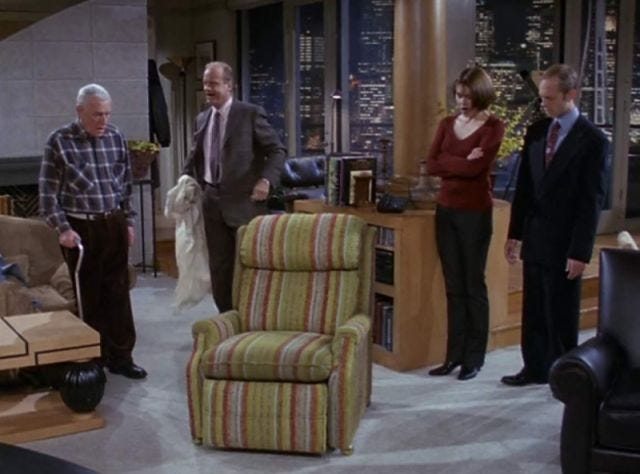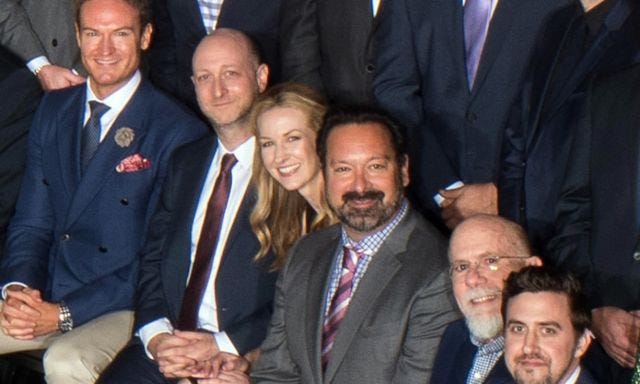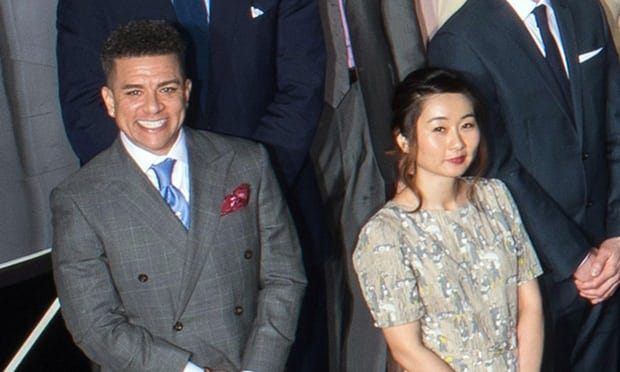EPISODE 303: TOSSED SALAD AND SCRAMBLED EGGS

POP CULTURE SPIRIT WOW
As long as I can remember the basement of my parents’ house in Chicago has been our living room. We don’t call it that; the “living room” is the room off the front door with the nice furniture and a fireplace. The basement is just "the basement".
But growing up we never spent any time in the living room, other than to open presents at Christmas or when guests came. The couches and chairs were nice; you didn’t want to make things dirty.
No, our main family space was gathered around the television in the basement.
Every house has some things that are more important than others. I don’t mean oven versus chair (that cage match is over in three seconds, take that chair!), or bathroom versus closet (you’re good to have, but I don’t need you, closet!). I mean things that somehow define life for those who live in it. The house’s versions of the Mona Lisa, if you will (or the house’s actual Mona Lisa, if you’ve got that kind of cash and sensibility; “I just think her smile ties the room together, suck it Guernica!”).
Some of the main icons of our house, at least for me, were in that basement. There’s the wall of photos next to the television, with the large painting in the center of my sister Meggan, who passed away about twenty five years ago.
There’s the furnace in the back, plaster walls and concrete floor the last remnant of what the basement space was like before my dad finished it. It’s space no guests ever see, and that none of us really spend much time in, but I don’t know, a furnace, it’s such a strange creature, ugly and mechanical and not at all like everything else in people’s homes. It can’t help but sort of stand out.
(Also my dad is a pipefitter by trade; heating and air conditioner were his business. And though he spent his career working not on home units but HVAC for huge buildings, he certainly spent his share of time lying next to our furnace, trying to fix this or that.)
But really, if our family was on a game show where we each had to name the one object that most stood out in our house growing up, I think we would probably all name my dad’s La-Z-Boy. That’s always been where he crashes -- where he catches the game, where he takes calls, in more recent years where he scans his iPad. Some years it’s been a nice chair, leather and smooth, and sometimes it’s been one step away from a dumpster fire and we’ve begged him to let us get a new one because you can feel the springs when you sit down and he insists “I like it like that".
Every Jesuit community I’ve ever lived in has a TV room filled with La-Z-Boys. It’s always a little odd to walk in when the room’s empty. It looks like an abandoned flight deck (but with crumbs). And somehow in my folks’ house that’s an apt analogy. The La-Z-Boy was sort of like Dad’s pilot chair, the place from which he looks out on (and interacts with) the world. But with leg rests.
(Suddenly I’m wondering whether this means I actually grew up on the Millennium Falcon. My childhood just got so much cooler.)
Speaking of which:

++
It’s a weird term, “La-Z-Boy”. Everyone occasionally gets to have a “lazy” afternoon or Sunday morning, but no one likes to be called lazy. Maybe “boy” is meant to grant permission; being an adult is hard, sometimes you get to be a kid again. But I guess only if you’re a man? Almost certainly there’s a “Dad goes to the office while Mom cleans the house” idea built in.
The chairs have been around since 1928. According to Wikipedia two cousins in Michigan started the La-Z-Boy company; they set out to design a chair for “nature’s way of relaxing”. (You might have thought that was “lying down”. But this way you can do it while also sitting!)
No one would mistake the chairs for elegance. Usually they’re an eyesore, carpeting that’s been allowed to breed beyond the floor.
An ad I saw from a few years ago had Brooke Shields sitting comfy along a non-shaggy, almost tasteful chair with the saying “When La-Z-Boy says ‘relax’, it doesn’t necessarily mean ‘recline’.” Good luck with that brand pivot, La-Z-Boy. We wish you well.
But recliners are not about style; in fact, they’re a response to it. They’re the us we get to be when we don’t have to dress up for others, when guests aren’t around – our feet up; tired, frankly, and our burdens and responsibilities put aside for the moment.
A chair like that is about being allowed relief and also release.
++
The actor John Mahoney died this week. If his name’s not immediately familiar, his most famous role was as Frasier’s dad the retired widower Martin on the TV show Frasier.

About five months ago the New Statesman did a whole piece on Martin Crane and his La-Z-Boy. The headline tells you how great is the story: “Martin Crane’s hideous chair was the true star of Frasier.”
The piece is about how Frasier was a show in part about the problems of class – and about valuing people no matter how much money or education they have. For as delightful as they are to watch, Frasier and his brother Niles are the worst kind of snobs, catty, judgmental and myopic. Seriously, who among us could have endured ten minutes with them?
And time and again the heart of the show was not only sending their elitism up in the most hilarious of ways, but also calling it out as a just plain crappy way to treat people.
And that role almost always fell to John Mahoney. He was both the show’s “guy like us” and also its moral center.
(Random aside: From a writing standpoint that’s a brilliant combination. He not only feels and says what we’re thinking about the boys, helping us to feel at home in their kooky world, he represents a decency that makes us feel good about ourselves, even though at times what he’s saying is actually quite challenging.)
The article points to a bunch of examples of Mahoney “speaking the truth”. My favorite is the time the boys want to take him to some fancy restaurant, but when the place loses their reservation they’re stuck going to the place Martin likes, which of course they loathe. So they harp on about everything, until he gives this speech:
Alright, that's it. I've had enough of you two jack-asses. I've spent the whole night listening to you making cracks about the food and the help. Well, I got news for you: people like this place. I like this place. And when you insult this restaurant, you insult me.
You know, I used to think you two took after your mother, liking the ballet and all that, but your mother liked a good ball game too. She even had a hot dog once in a while. She may have had fancy tastes, but she had too much class to ever make me or anybody else feel second-rate. If she saw the way you two have behaved tonight, she'd be ashamed. I know I am.

What It Feels Like When You're Present to a Comment Like That
The chair was not only Martin but that issue in a nutshell. Having nice stuff is definitely nice, but it’s not what’s important. Not like respect for others. Kindness. And family.
At the end of the first season Martin’s chair gets accidentally thrown out. Frasier offers to get him another chair. This is what Martin has to say:
Okay, I'll tell you what chair I want. I want the chair I was sitting in when I watched Neil Armstrong take his first step on the moon. And when the US hockey team beat the Russians in the '80 Olympics. I want the chair I was sitting in the night you called me to tell me I had a grandson. I want the chair I was in all those nights, when your mother used to wake me up with a kiss after I'd fallen asleep in front of the television. You know, I still fall asleep in it. And every once in a while, when I wake up, I still expect your mother to be there, ready to lead me off to bed...
Oh, never mind. It's only a chair. Come on, Eddie.

I’m fine. Really.

Actually I may need a minute. Talk amongst yourselves.
++
While I’m recovering: Sarah Larson at The New Yorker did this tribute to Mahoney, and the Chicago Tribune this one. (Mahoney spent most of his adult life in Chicago; “the city is almost like a person to me," he once said. "I can't tell you why my heart is so full of Chicago, but it's where I want to be. When I'm not here, I'm not as happy.")

++
This week I came across two articles by women that taught me a lot. One was this piece in the New York Times about the hardship of having fibroid growths, and the incredible liberation a hysterectomy offers.
The other was this extraordinary piece about the screwed up things that society teaches us to think about a woman’s experience of having sex, specifically the pain women so often go through during sex that they have been told to see as normal and fine and legitimate.
It’s really a great piece, one of those “everybody read this”. ++ For me the other “must-read" of the week, though strictly from a guilty pleasure point of view, is music legend Quincy Jones losing his mind on Vulture.
A couple excerpts that I swear by Mary, Joseph and the Baby Jesus I have not made up:
You worked with Michael Jackson more than anyone he wasn’t related to. What’s something people don’t understand about him?
I hate to get into this publicly, but Michael stole a lot of stuff....The notes don’t lie, man. He was as Machiavellian as they come.
How so?
Greedy, man. Greedy. “Don’t Stop ’Til You Get Enough” — Greg Phillinganes wrote the c sectionPhillinganes, an in-demand studio keyboardist, played on a handful of Jackson-Jones collaborations, including the 1979 album Off the Wall, from which “Don’t Stop ‘Til You Get Enough” comes. Michael should’ve given him 10 percent of the song. Wouldn’t do it.
...What was your greatest musical innovation?
Everything I’ve done.
...What’s something you wish you didn’t know?
Who killed Kennedy.
Who did it?
Chicago gangster Sam Giancana is a well-known name among Kennedy conspiracists, both for his alleged help in delivering Illinois votes for Kennedy in the 1960 presidential election and the 1963 assassination of the president. The latter theory largely stems from Giancana’s murder in 1975, not long before he was supposed to testify before a Senate committee investigating collusion between the mob and the CIA. . The connection was there between Sinatra and the Mafia and Kennedy. Joe Kennedy — he was a bad man — he came to Frank to have him talk to Giancana about getting votes.
I’ve heard this theory before, that the mob helped win Illinois for Kennedy in 1960.
We shouldn’t talk about this publicly. Where you from?
Yep. That is a thing that actually happened. Enjoy.
++ LINKS ++
The Guardian looks at the 2018 Oscar class photo and finds hilarious things:

James Mangold’s head is magnificent. Carved in broad strokes from thick varnished oak and adorned with a felt-tip swipe of a beard, the Mangold head radiates charisma and obliterates all around it.

Sweet mother of God, those are some teeth. In fact, I’m not sure these even qualify as teeth. Celebrate his Mudbound screenplay all you like, but do not stare directly into Virgil Williams’s mouth. I did, and now my retinas are nothing but dried-out husks.
An LA-based journalist imagines what it would look like if LA journalists wrote about New York the way the Times writes about Los Angeles. (And he is dead on, as are so many of the comments.)
The five year photo journal of the Mars Rover Curiosity.
The greatest Super Bowl commercial, maybe one of the greatest ever. Tell me you won’t be thinking about clothing and laundry detergent every time you watch a commercial from now on.
Finally, from Warren Ellis’ newsletter this week, a quote from scifi writer Alfred Bester:
This strange second in a life, that unusual event, those remarkable coincidence of environment, opportunity and encounter... all of them have been reproduced over and over on the planet of a sun whose galaxy revolves once in two hundred million years and has revolved nine times already. There has been joy. There will be joy again.
One step at a time.
Here we go.

